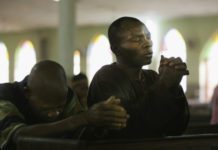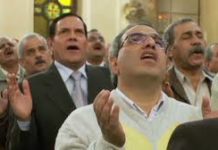By Martin Roth, BosNewsLife Senior Columnist

CAIRO, EGYPT (BosNewsLife Columns)– The exciting but controversial discovery of what could be the oldest known fragment of a Christian gospel – scraps of recycled papyrus used to make an Egyptian mummy’s mask – puts the spotlight on Egypt’s Coptic Christians.
At present, the earliest known texts of New Testament writings are from the second century. But this new fragment, containing part of the Gospel of Mark, is believed to be from around 90AD. It confirms again that the Coptic Church traces its origins right back to the beginnings of Christianity.
In ancient Egypt discarded papyrus sheets were often used, together with paint and glue, to create masks that were placed on a mummified body. Until recently it was generally not possible to read these sheets, because they were glued tightly together.
But a new technique allows scientists to remove the glue from the mask while leaving the writing intact. The texts can thus be read, although the mask is essentially destroyed, and so the practise has caused much controversy.
Unconfirmed stories about the gospel discovery have been circulating since 2012, but re-emerged last month when the LiveScience website posted an article stating that the scholars involved were planning to issue a full report on their findings later this year.
SPECIAL PLACE
Egypt holds a special place in the history of the church: Mary and Joseph fled there with the infant Jesus. Saint Mark founded the Egyptian church just a decade after the death of Christ, possibly wrote his gospel there and was martyred there.
In addition, few places better symbolized the third-century church father Tertullian’s famous statement, that the blood of the martyrs was the seed of the church.
In the words of the Tour Egypt website: “It was in Egypt that some of the greatest defiances of the Romans by Christians were done. While their Roman counterparts worshipped in catacombs and underground vaults, the Egyptian Christians built their churches openly and performed their ceremonies in full view of the Empire. And for every one that the Empire struck down, more would be converted by the example of the martyr.”
For several hundred years Egypt was a proudly Christian nation. Then the Muslim invasion of the seventh century saw the country slowly turn into an Islamic state. Today Christians number only around 10 per cent of the population.
But the martyrdoms continue. Recent years have seen some particularly grotesque attacks on Christians from Saudi-inspired Islamists. The Islamists even try to deny the Christian heritage of Egypt, which makes the recent papyrus discovery important.
LITTLE KNOWN
Yet Christians in the West generally know little about the Coptic Church. This is unfortunate, as it has much to teach us.
In the early centuries it taught that to become a Christian was possibly to enter a world of suffering.
Now, with persecution on the rise in many parts of the world, we see a praying church that, despite enduring many centuries of hardship and martyrdom, stands strong, proud and defiant.
For nearly 2,000 years it has remained true to its calling – true to Christ, true to the Bible, true to its teachings and unafraid of death.
This should be an inspiration to us all.
(Martin Roth (www.authormartinroth.com), BosNewsLife’s Senior Correspondent, is an Australian journalist and a former Tokyo-based foreign correspondent. He is the author of “Journey Out Of Nothing: My Buddhist Path to Christianity” and of the Brother Half Angel series of thrillers, which focus on the persecuted church. The latest of these is “The Coptic Martyr of Cairo.” BosNewsLife Columns distributes opinionated columns and commentaries providing a fresh perspective on issues in the news. They do not necessarily reflect the opinion of BosNewsLife News Agency or its parent company).








